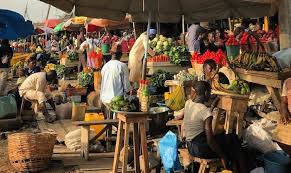24.8 million Nigerians risk starvation in 2023, FAO warns
March 17, 2023541 views0 comments
By Onome Amuge
Over 24 million Nigerians in 24 states and the Federal Capital Territory (FCT) are at risk of acute food shortages between June and August 2023, according to the March 2023 cycle of the Cadre Harmonise (CH) report by the Food and Agriculture Organisation (FAO).
The CH, recognised as a relevant analytical tool, is adopted by partners in the Food Security Sector (FSS), and developed on request by the government as an early warning tool to prevent and manage food and nutrition crises.
The latest CH report, launched in Abuja, Nigeria’s capital city, identified persistent fuel scarcity,cash crunch arising from the naira re-design policy,worsened insecurity, among the major factors leading to the increase in prices of food commodities and resultant food crisis in the most populous African country.
Read Also:
- Global insurance at risk as US tariffs expand
- Goldman Sachs flags risk of sub-$60 oil by end of 2025
- Balancing surveillance, security, and data protection risk
- Nigeria faces FX, economic risk as 14% US tariff disrupts trade ties
- NIA urges Nigerians to embrace insurance as a vital tool for financial security
The March 2023 cycle of the CH analysis covered 26 states of Nigeria, namely: Abia, Adamawa, Bauchi, Benue, Borno, Cross-River, Edo, Enugu, Gombe, Jigawa, Kaduna, Kano, Katsina, Kebbi, Kogi, Kwara, Lagos, Nasarawa, Niger, Ogun Plateau, Rivers, Sokoto, Taraba, Yobe, and Zamfara, and the Federal Capital Territory (FCT).
According to the report, insecurity, especially insurgency in the North East states still persists. It also observed that armed banditry and kidnapping for ransom in some North West states such as Katsina, Sokoto and Kaduna state as well as North Central states of Benue and Niger are yet to be addressed.
Cadre Harmonise also found that prolonged scarcity of petrol, and the associated hike in pump price across the states led to the astronomical rise in transport fares and cost of food products in Nigerian markets.
It further noted that the 2022 flood incident which destroyed hundreds of thousands of hectares of cropped field, livestock, stocked fish ponds and stock of foods at both household and market levels, hindered food productivity. This, it pointed out, is in addition to limitations of market flows and physical access to markets as some market routes were either washed off or submerged for a few weeks.
 “Consistent rising price of food commodities and agricultural inputs across Nigerian markets is one of the drivers of food insecurity. The general consumer price index shows an increase from 15.7% in February 2022 to 21.9% in February 2023 (that is 39.49% point increase) year-on-year.” the report said.
“Consistent rising price of food commodities and agricultural inputs across Nigerian markets is one of the drivers of food insecurity. The general consumer price index shows an increase from 15.7% in February 2022 to 21.9% in February 2023 (that is 39.49% point increase) year-on-year.” the report said.
Furthermore, the report identified the naira redesign policy of the Central Bank of Nigeria, (CBN and its multiplier effects as one of the key drivers of the crisis, noting that many Nigerians were rendered financially stranded as they could not have access to cash that would have enabled them to purchase food items.
The government-led and UN-supported food and nutrition analysis also showed that
during the current analysis period, most of the households in the analysed areas adopted crisis to worse level livelihood coping measures. It explained that the implication is that most households had irreversibly disposed of their livelihood assets to meet their food and non-food needs, and is most common in the insurgency affected states of Adamawa, Borno and Yobe, where the number of affected LGAs stood at 4, 13, and 10 respectively.
Fred Kafeero, FAO country representative to Nigeria and ECOWAS, during the release of the CH result, expressed worry of further increased vulnerability to food and malnutrition during the 2023 lean season.
On the way forward, Kafeero emphasised the need for Nigeria to re-commit and utilise available means and resources to mitigate further deterioration of the food security situation in the country.
Kafeero noted that the FAO has continued to support the government in leading the implementation of CH processes nationally, both in terms of funding as well as technical support, despite resource limitations and competing demands.
On his part, Ernest Umakhihe,the permanent secretary, ministry of agriculture and rural development, assured partners of governments’ commitment to upholding the outcome and recommendations arising from the result with a view to enhancing the food and nutrition security situation in the concerned states through an objective intervention programme.
Umakhihe, who was represented by Ibrahim Tanimu,the director, department of planning and policy coordination, called on all participants to contribute positively to the issues emanating from the results to enhance its quality, usefulness and acceptability by the spectrum of stakeholders.
